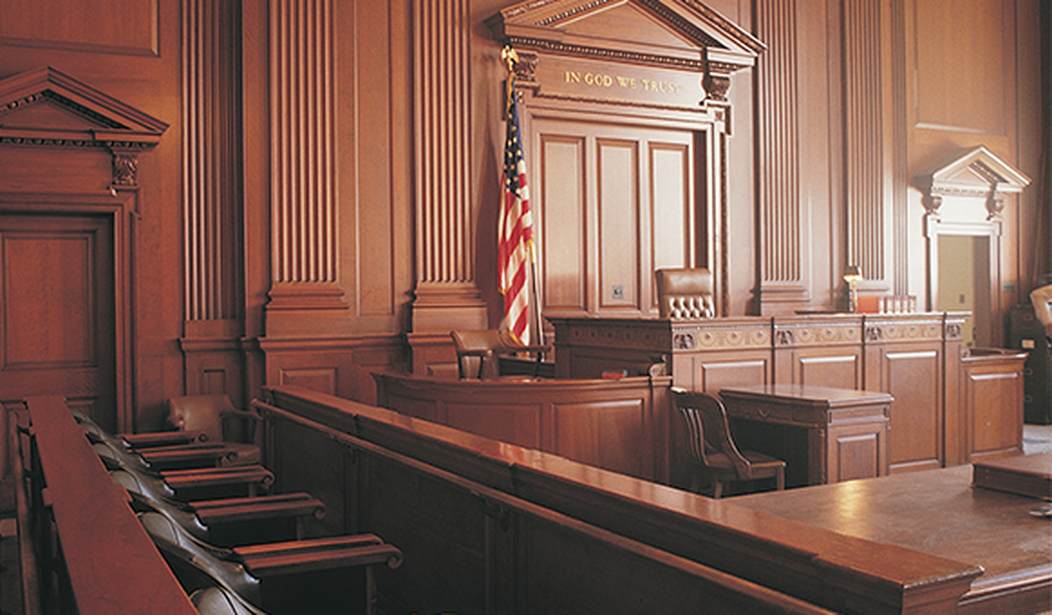At least for now, Byron Tanner Cross has a paying job with the Loudoun County Public Schools. The state supreme court in Virginia upheld an injunction forbidding the district from suspending or punishing Cross for his remarks opposing a proposed transgender-pronoun policy. The remarks came at a public-comment session in May, in which Cross cited his religious beliefs in stating that he would act on biological truth rather than personal identity when choosing pronouns.
The state supreme court demolished every one of the district’s arguments in seeking to lift the injunction, although the Associated Press is uncharacteristically terse in reporting that:
The school system said it suspended Cross in part because his comments caused a disruption at the school. But the lower court judge, James Plowman, and the state Supreme Court agreed that the handful of calls fielded by school administrators did not cause the type of disruption that warranted a suspension.
Tuesday’s ruling leaves in place a temporary injunction that bars the school system from suspending Cross. A trial is scheduled for next week in Loudoun County to settle the issue permanently.
The ruling from both the lower court and the state supreme court opinion make those prospects dim indeed for LCPS. Courts only impose injunctions when the applicant has a good chance of winning the case at trial and is suffering irreparable harm in the meantime. If LCPS didn’t get the message at the district court level, the unanimous opinion from the high court makes it clear that they’re heading for a loss. These paragraphs get to the crux of the free-speech issues (“the Defendants” refers to LCPS):
Although we have not had occasion to map the precise contours of the rights protected by this Clause, we have generally described Art. I, § 12 of Virginia’s Constitution as “coextensive with the free speech provisions of the federal First Amendment.” See Elliott v. Commonwealth, 267 Va. 464, 473-74 (2004). Looking to federal precedent as persuasive, it is settled law that the government may not take adverse employment actions against its employees in reprisal for their exercising their right to speak on matters of public concern. See Love-Lane v. Martin, 355 F.3d 766, 776 (4th Cir. 2004) (citing Pickering, 391 U.S. at 573). Determining whether the Defendants transgressed that prohibition involves a “two-step inquiry,” where the first step asks whether Cross spoke on an “issue of social, political, or other interest to a community.” Urofsky v. Gilmore, 216 F.3d 401, 406-07 (4th Cir. 2000) (citing Connick, 461 U.S. at 146). The Defendants do not dispute that Cross did. The targeted speech in our case ‘did not amount to fighting words’ and were ‘not obscene’ but rather were ‘the kind of pure speech to which . . . the First Amendment would provide strong protection.’” Mahanoy Area School District v. B.L., 141 S. Ct. 2038, 2047 (2021) (citations omitted).
The second step requires weighing Cross’ interest in making his public comments against the Defendants’ “interest in providing effective and efficient services to the public.” Billioni v. Bryant, 998 F.3d 572, 576 (4th Cir. 2021) (internal quotation marks omitted). Performing this “difficult” balancing of interests required the circuit court to examine the unique circumstances of this case, including the context in which Cross made his public comments and the extent to which they disrupted Loudoun County Public Schools’ “operation and mission.” Connick, 461 U.S. at 150; Ridpath, 447 F.3d at 319 (internal quotation marks omitted). As the parties and the circuit court recognized, the Fourth Circuit has developed nine factors to consider when gauging the magnitude of the disruption a public employee’s speech causes his employer. See Ridpath, 447 F.3d at 317.
The Defendants incorrectly minimize Cross’ interest in making his public comments. See Hall v. Marion Sch. Dist. No. 2, 31 F.3d 183, 195 (4th Cir. 1994) (“When an employee’s speech substantially involves matters of public concern . . . the state must make a stronger showing of disruption in order to prevail.”). Cross made those comments at a public Board meeting where one of the issues under consideration was whether to adopt the transgender policy. As the Fourth Circuit has recognized, “[b]oth the [teacher] and the public are centrally interested in frank and open discussion of agenda items at public meetings.” Piver v. Pender Cnty. Bd. Of Educ., 835 F.2d 1076, 1081 (4th Cir. 1987) (examining claim that teacher was retaliated against, in part, for comments made at a public hearing); see also Pickering, 391 U.S. at 573 (“free and unhindered” debate on matters of public importance is the “core value” of the First Amendment). Further, in addition to expressing his religious views, Cross’ comments also addressed his belief that allowing children to transition genders can harm their physical or mental wellbeing. This is a matter of obvious and significant interest to Cross as a teacher and to the general public. See Janus v. American Fed. of State, Cnty., and Mun. Employees, Council 31, 138 S. Ct. 2448, 2476 (2018) (commenting that speech on sensitive and controversial political subjects that are of “profound value and concern to the public,” like “sexual orientation and gender identity,” “occupies the highest rung of the hierarchy of First Amendment values and merits special protection.”) (internal quotation marks and citation omitted). Moreover, Cross was opposing a policy that might burden his freedoms of expression and religion by requiring him to speak and interact with students in a way that affirms gender transition, a concept he rejects for secular and spiritual reasons. Under such circumstances, Cross’ interest in making his public comments was compelling. See Meriwether v. Hartop, 992 F.3d 492, 509-10 (6th Cir. 2021) (explaining that a Christian university professor’s First Amendment interest in not using students’ preferred gender pronouns was “especially strong . . . because [his] speech also relates to his core religious and philosophical beliefs” and because requiring the professor to use students’ preferred gender pronouns “potentially compelled speech on a matter of public concern”); see also Boy Scouts of Am. v. Dale, 530 U.S. 640, 660 (2000) (“[T]he fact that an idea may be embraced and advocated by increasing numbers of people is all the more reason to protect the First Amendment rights of those who wish to voice a different view.”). Although the Board may have considered Cross’ speech to be “a trifling and annoying instance of individual distasteful abuse of a privilege,” we believe Cross has a strong claim to the view that his public dissent implicates “fundamental societal values” deeply embedded in our Constitutional Republic. Mahanoy, 141 S. Ct. at 2048. (citation omitted)
The court was less inclined to tackle the free-expression claims made by Cross in his lawsuit and application for injunctive relief. That appears to be mainly because it’s superfluous to the challenge at this point.
Alliance Defending Freedom, which represents Cross in this case, celebrated this victory in defense of both constitutional freedoms anyway:
“Teachers shouldn’t be forced to promote ideologies that are harmful to their students and that they believe are false, nor should they be silenced for commenting at a public meeting,” said ADF Senior Counsel Tyson Langhofer, director of the ADF Center for Academic Freedom. “The lower court’s decision was a well-reasoned application of the facts to clearly established law, as the Virginia Supreme Court found. But because Loudoun County Public Schools is now requiring all teachers and students to deny truths about what it means to be male and female and compelling them to call students by their chosen pronouns or face punishment, we have moved to amend our lawsuit to challenge that policy on behalf of multiple faculty members. Public employees cannot be forced to contradict their core beliefs just to keep a job.”
To support its ruling in Loudoun County School Board v. Cross, the Virginia Supreme Court pointed to another ADF case, Meriwether v. Hartop, in which “the Sixth Circuit emphatically held that a university professor stated viable free speech and free exercise claims based on his university’s disciplining him for refusing, based on his Christian faith, to use a student’s preferred pronouns.”
Loudoun County should review this ruling carefully and decide just how much money they want to spend on a trial that they’re all but certain to lose. And in the future, perhaps they can use that money to educate children rather than police pronouns. Just a thought.








Join the conversation as a VIP Member